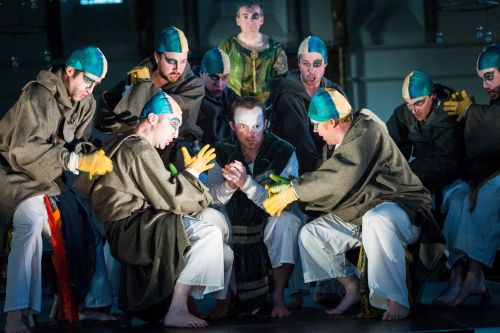Benjamin Britten, The Prodigal Son, The Burning Fiery Furnace: Mahogany Opera, Jubilee Opera, Aurora Orchestra, Roger Vignoles (music director), Orford Church, Suffolk 21.6.2013 (MTH)
The Prodigal Son
Cast:
The Tempter: James Gilchrist
The Father: Lukas Jakobski
The Elder Son : Rodney Earl Clark
The Younger Son: John McMunn
The Burning Fiery Furnace
Cast:
The Abbott: The Astrologer: Lukas Jakobski
Nebuchadnezzar: James Gilchrist
Ananias (Shadrach): Samuel Evans
Misael (Meshach): John McMunn
Azarias (Abednego): Rodney Earl Clarke
The Herald: Douglas Nairne
Production:
Director: Frederic Wake-Walker.
Designer: Kitty Callister
Lighting Designer: Ben Payne

© Robert Workman
When one thinks of the opera works of Benjamin Britten, the Church Parables may not immediately come to mind. How appropriate then that these shorter chamber operas should be performed in the venue where they premièred for this Britten Centenary year as part of the 66th. Aldeburgh Festival of Music and the Arts.
The Church Parables were originally staged in the 1960’s when Britten chose St. Bartholomew’s Church, Orford in Suffolk for its very fine musical acoustic and it was just perfect for the atmospheric staging of the current performances. The writing of each work was inspired by Benjamin Britten’s interest in two notable works of art. The Rembrandt depiction of the Prodigal Son to be seen in the Hermitage, St. Petersburg and the stained glass window representation of the Burning Fiery Furnace in Chartres Cathedral. In the original production, the style and some instrumentation showed a clear connection with Japanese Nō theatre, in which Britten became greatly interested during his visit to Japan in 1956.
An excellent line up of soloists was well matched by the fine chorus of Mahogany Opera and the youthful voices of Jubilee Opera. Each group working very effectively to bring the two biblical parables to life in 2 highly stylised productions. [Sadly I was unable to attend Curlew River on the previous evening]
The staging by Frederic Wake-Walker was simple in concept, but highly effective, concentrating the attention on each story and with beautifully choreographed movement. It was notable that the entire cast stayed within the style throughout each parable without fault or respite. The staging of each opera used one set piece of scenery – a hut in The Prodigal Son and a stained glass window in The Burning Fiery Furnace with either natural light or up-lit from birdies, which proved most effective after sunset.
Musically, the excellent Aurora Orchestra was led from the chamber organ by the safe hands of Roger Vignoles. It is not often one sees musicians dress for the part, but here they appeared in monk’s habit and even joined in the celebratory procession to the temple of Merodak. – a truly integrated ensemble.
The Prodigal Son began atmospherically with the Monks and Acolytes Plainchant Iam lucis orto sidere whilst processing down the aisle to the performance platform. Once the cast and orchestra were assembled the story unfolded. Lukas Jakobski evolved from Abbott to the Father in commanding voice. His tall stature adding to his authority, yet he made a believably sympathetic character. As his sons; Rodney Earl Clarke was a deep baritonal Elder son and his younger brother, youthfully sung by tenor John McMunn, who became suitably errant. Each used stylised gestures to represent their emotion to excellent effect. This was skilfully integrated by the Director inspired by the methods of Sufism. The continuous interaction and dancing of the chorus in this style was also very effective.
As the story unfolded James Gilchrist excelled as the Tempter, with lissom tones and again stylised characterisation. The final celebration, on the return of the Prodigal Son, featured lively instrumental accompaniment by members of the youthful Jubilee opera. The opera closed as it began with the cast robed as monks, processing into the distance.
In The Burning Fiery Furnace the company again entered in monks’ habits to the 11th century sequence hymn – Salus aeterna, but this time when the monks disrobed, the underlying costume was bright and brash. The clever stained glass construction of the Burning Fiery Furnace took place before our eyes to become both the shrine of the god Merodak and the actual Furnace where the Angel appears. Balinese dance drama attitudes were employed throughout, though these became a little over emphasised at times. However, the commitment of soloists and chorus to the style was again superb.
Samuel Evans joined the soloists as Shadrach with the other Israelites sung by Rodney Earl Clark and John McMunn. Lukas Jakobski was a suitably scheming and sinuous Royal Astrologer, whilst James Gilchrist made a dominant and colourful King Nebuchadnezzar. Both still in fine voice as darkness fell, when the entire production took on a mystical feeling with the skilful use of up light.Worthy of special mention is the cameo role of the Herald sung by Douglas Nairne and also the Angel – who sadly was not named in the programme. Each was clear and fine toned in their delivery.
This was a splendid evening and surely Benjamin Britten must have been smiling down. The productions now go on tour to St. Petersburg, London and Buxton.
Martyn Harrison
For a second opinion, see Roderic Dunnett’s review